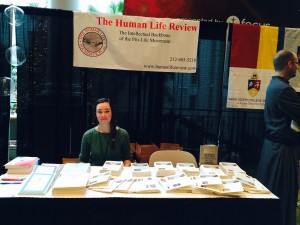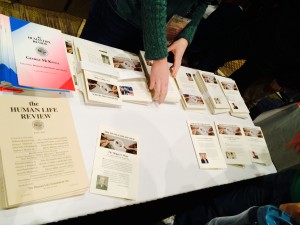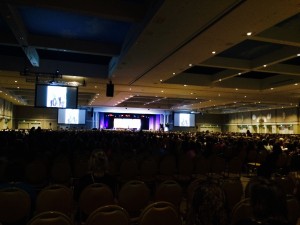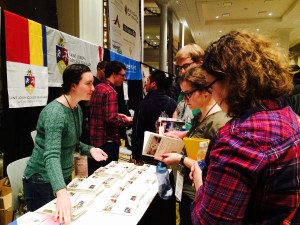the Human Life Review sponsors SEEK15
[Laura McLaughlin is a student at Boston College and a member of the HLR team that manned the Human Life Foundation’s sponsorship booth at SEEK-2015, a conference in Nashville (Jan. 1-4) that attracted 9,500 participants, most of them college students.]
Friday, January 2, 2015
Sixteen years ago SEEK held its first annual convention with 24 students. The next year it attracted 60, and then this year over 9,000.
The event began last night when thousands of college students poured in from all over the country via plane, train, and 10 hour bus rides. On the first night keynote speaker Matt Fradd kicked off SEEK with an animated and relatable talk on his own faith journey. From the beginning of the event it was clear that it is aimed at the young, not in a diminutive or silly pop-cultural focused way, but in a way that recognizes the unique position of people who are in the throes of questioning and having their beliefs questioned in the college environment. Matt Fradd was dynamic and thought provoking in his relating of his intellectual and emotional journey from apathy and atheism to a full relationship with God. His talk was inspiring to anyone raised Catholic who has doubts about God’s existence, or has concerned themselves with existential questions. He was inspiring in his presentation about the consequences of saying there is no God, and therefore no meaning or order in the universe or in our lives, in contrast with the fulfillment that faith brings.
After his talk Mass was held, and students dispersed to explore the Gaylord Opryland Hotel. The resort has eight acres under glass, many restaurants, shops, and high capacity spaces for speakers. Getting lost is easy but students, sisters, brothers, priests, and others with SEEK are all around and willing to help their fellow seekers find the events. There is a sense of energy and enthusiasm here as well as an unusually strong sense of spiritualism for college students. The night ended with a concert given by Matt Maher that was well attended and enjoyed in a room big enough to fit everyone. The day left everyone excited for the next four days.
* * * * *
Today is the first full day of SEEK 2015, a national conference put on this year in Nashville by the Fellowship of Catholic University Students—known as FOCUS. Through this organization recent college graduates become missionaries and are sent to college campuses to evangelize. It began in 1998 and has grown to have an on-campus presence at 99 schools.
After spending some time telling people who stop by our table about the Human Life Review, I go to hear a talk exclusively for women given by Sister Mary Gabriel of the Sisters of Life, an order of nuns whose focus is pro-life. I live near their retreat center in Stamford (CT) and have spent many hours cleaning and making beds there. I have also visited their convent in New York City where they house pregnant women and new mothers.
The sisters are all extremely dedicated, enthusiastic, and compassionate. Sister Mary Gabriel speaks about the special role of women in God’s plan and how a woman’s natural instinct to love is her greatest asset. She emphasizes that as women who need to love, we cannot settle for something inauthentic—something that promises us everything and delivers nothing—simply because we are afraid of what our lives would look like without the façade of happiness. Rather, we are worthy of real love and relationships, and a lasting happiness found not in what the world says will make us happy but in what God says will make us happy. All around us are messages seemingly promoting the empowerment of women through money, clothes, makeup, or, more dangerously, the right to free contraceptives and abortion. However, on closer examination, these things only enslave women, and ignore their need for real love. This talk is inspiring for women who so often receive the wrong advice about how they should look, act, and think; it is also important because it reflects a unique female perspective.
* * * * *
After Sister’s talk, lunch is served (successfully!) to nearly 10,000 people,  who mix with each other at tables and compare bus rides to Nashville. The longest one I have heard about was 30 hours, from a group that came from Arizona. I try to learn what the people at my table are interested in, and tell them about the Human Life Review. Many are studying pre-medicine, nursing, pharmacy, public health, or related fields, and want to know how American law impacts their desired profession and the people they will be treating. Others, who are interested in politics, pick up reprints of President Ronald Reagan’s 1983 Human Life Review article, “Abortion and the Conscience of the Nation,” and Professor George McKenna’s essay, “Criss-Cross: Republicans, Democrats, and Abortion.” Above all, the students I am meeting value the commitment to the pro-life movement, which is more popular than one might imagine among the millennial generation—as Students for Life president Kristan Hawkins writes about in another Review reprint we are handing out at the conference, “Pro-life Millennials: The Polls vs the Facts.”
who mix with each other at tables and compare bus rides to Nashville. The longest one I have heard about was 30 hours, from a group that came from Arizona. I try to learn what the people at my table are interested in, and tell them about the Human Life Review. Many are studying pre-medicine, nursing, pharmacy, public health, or related fields, and want to know how American law impacts their desired profession and the people they will be treating. Others, who are interested in politics, pick up reprints of President Ronald Reagan’s 1983 Human Life Review article, “Abortion and the Conscience of the Nation,” and Professor George McKenna’s essay, “Criss-Cross: Republicans, Democrats, and Abortion.” Above all, the students I am meeting value the commitment to the pro-life movement, which is more popular than one might imagine among the millennial generation—as Students for Life president Kristan Hawkins writes about in another Review reprint we are handing out at the conference, “Pro-life Millennials: The Polls vs the Facts.”
* * * * *
After lunch, SEEK continues with “impact” sessions, shorter talks given twice a day on a range of subjects. I choose one by Kevin Cotter on Pope Francis, entitled “Cracking the Pope Francis Code.” It begins with a biographical presentation, moving from Francis’ life in a poor family “with dignity” to the special concern for the poor he felt when he became a Jesuit priest, a concern that continues today. Cotter explains that the media has an angle—to make money and to push their own viewpoint. Therefore some of the things we hear about Francis (who actually has a strong faith in Catholic teaching) are twisted: for instance that he thinks same-sex marriage and divorce are okay. Cotter decoded the Pope’s real message, which is both adherent to the Catechism and more inspiring than what the media reports. Francis may indeed be a reformer, but not the kind the media is looking for.
After this, I am turned away from “Doorways into the Demonic,” a talk on exorcism, due to overcrowding. Instead, I go to one called “Suffering and the Love of God.” Father Robert Spitzer speaks about personal experiences that are moving—not because they are shocking or horrific, but because they are as universal as being picked on and shunned as a child in school. The seeming triviality of this short-lived experience is the key to his message: He says we must address our wounds so as to not let them fester and become infected. Bad experiences can leave us with “landmines” in our hearts. If we do not allow Jesus to take care of our suffering, Father says, we make our hearts as inaccessible to others as a landmine-filled field. This talk is profound because often when people are hurt they become bitter and hard. Instead, we stay vulnerable, and in doing so develop a kind of easily-healed heart. Anyone who has cared for the sick would probably agree that a strong immune system is a better asset than keeping everyone at arm’s length.
* * * * *
The last talk of the evening is given by keynote speaker Helen Alvaré, an associate law professor at George Mason University and former pro-life lawyer and lobbyist for the National Conference of Catholic Bishops. It is very inspiring to anyone who fears they will leave college without the prospect of making a lot of money, which is probably most people, at least the ones I know. She explains that she continued to take pay cuts in her jobs as a lawyer because she was attracted to work that was meaningful but paid less. Nonetheless she was happy to make less than she, an intelligent woman, could be making, just as she is happy to reject materialism in her life now.
 In a way it means more for a lay person to talk about being detached from the desire for money and possessions because of ever constant temptation. I am astounded when Alvaré says all of the furniture in her house probably cost less than a thousand dollars, and that this is freeing because she never worries about it getting ruined, and does not have too much stuff to move when changing homes. I personally have never met a woman who does not care about the furniture in her house: We have probably all seen at least one house where most of the furniture is covered in plastic, or a room with “the good furniture” that anyone under 20 is not allowed to touch or even LOOK AT for fear of ruining it! Alvaré describes not having an excess of material possessions as freeing because it translates into less worry. If one were to take this message and apply it on a larger scale—how society should act—we perhaps would not be so concerned with conforming to what the world says we should want and do, and live more authentically by not putting our energies into getting what we want but rather into fulfilling the needs of the poor and vulnerable.
In a way it means more for a lay person to talk about being detached from the desire for money and possessions because of ever constant temptation. I am astounded when Alvaré says all of the furniture in her house probably cost less than a thousand dollars, and that this is freeing because she never worries about it getting ruined, and does not have too much stuff to move when changing homes. I personally have never met a woman who does not care about the furniture in her house: We have probably all seen at least one house where most of the furniture is covered in plastic, or a room with “the good furniture” that anyone under 20 is not allowed to touch or even LOOK AT for fear of ruining it! Alvaré describes not having an excess of material possessions as freeing because it translates into less worry. If one were to take this message and apply it on a larger scale—how society should act—we perhaps would not be so concerned with conforming to what the world says we should want and do, and live more authentically by not putting our energies into getting what we want but rather into fulfilling the needs of the poor and vulnerable.
The first full day of SEEK 2015 was fantastic and everyone is excited for more. We have been pushing hard for new subscribers and have gotten some who are very excited to start receiving the Human Life Review. Some are familiar with it because of their parents, but many have never heard of the Review and are quick to listen to information about it and to pick up the pamphlets with reprints of individual articles.









